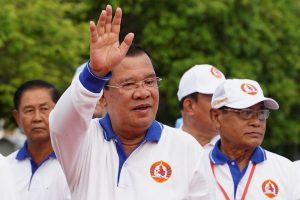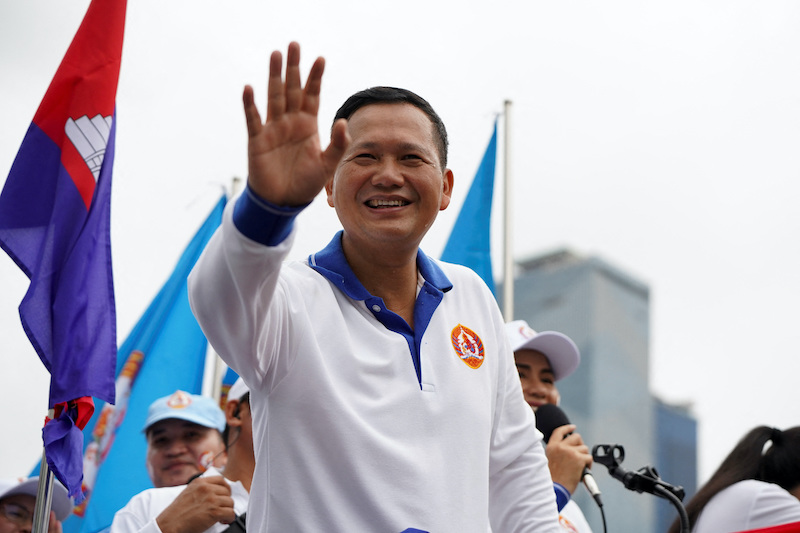Interest in Sunday’s election in Cambodia focuses mainly on what happens after the polls, rather than which political party will win.
Almost all observers believe the ruling CCP – Cambodian People’s Party – will continue to dominate local politics, given the ruthless elimination or jailing of any serious rival groups in recent years and the CCP’s vast resources.
But all eyes are focused on the historic leadership transition expected after the ballot, which looks likely to see the official retirement of one of world’s longest-serving premiers.
Prime Minister Hun Sen, 70, is a former Khmer Rouge guerrilla who has led Cambodia for 38 years and has brushed off Western concern about the election’s credibility.
He appears determined to prevent any obstacle in a carefully calibrated transition to his anointed successor and eldest son, Hun Manet.
ALSO SEE: China Property Crisis Intensifies, Cloud Over Country Garden
Hun Manet, 45, the heir apparent
No timeframe had been given for the handover until Thursday, when Hun Sen signalled that his son “could be” prime minister in three or four weeks, depending on “whether Hun Manet will be able to do it or not”.
He needs to win a National Assembly seat to become prime minister, which looks likely.
Hun Manet, dressed in a green safari shirt, smiled and posed for selfies with supporters after he cast his ballot in the capital Phnom Penh before a throng of media. He declined to comment on the prospect of becoming premier and said he was exercising his voting right.
Analysts had expected the transition to come mid-term, giving time for 45-year-old Hun Manet to earn legitimacy with the public and political elite.
“Transferring power while he is still physically and mentally well allows Hun Sen to strongly protect his son from any internal challenges,” Gordon Conochie, adjunct research fellow at La Trobe University and author of a new book on Cambodia’s democracy, said.
“As long as Hun Sen is around, nobody will move against Hun Manet.”
No clues yet on whether new PM will liberalise
Hun Manet has given few media interviews and no clues over his vision for Cambodia and its 16 million people.
He earned a master’s degree at New York University and a doctorate at the University of Bristol, both in economics, and attended the West Point military academy, helping him rise through the ranks of Cambodia’s military to army chief and deputy armed forces commander.
Major powers will be watching closely for signs of whether Hun Manet will maintain the authoritarian status quo of his father or pursue greater liberalisation and a more Western style of democracy.
A key focus will be if he seeks to steer Cambodia out of the orbit of China and patch up ties with the United States that have perennially been strained by his father’s iron-fisted approach.
Hun Manet received a rock-star reception at a big rally on Friday, where he promised a vote for the CPP was “for a bright and prosperous future” and warned of unspecified “extremist” attempts to “destroy the election”.
The rhetoric echoes that of Hun Sen in his vitriol against opponents and pre-emptive strikes since May that have included disqualifying the CPP’s only meaningful rival, the Candlelight Party, over a paperwork technicality.
Hun Sen seen standing down, watching over his son
Authorities also banned self-exiled opposition figurehead Sam Rainsy and 16 allies from voting and contesting elections for two decades for urging Cambodians to destroy their ballots.

Hun Sen cast his vote in Kandal Province, a few hours outside the capital, kissing his ballot paper before posting it and posing for pictures, smiling, with an ink-stained finger.
There are 17 other mostly obscure parties running, none of which won seats in the last election, in 2018.
The CPP’s selling point has been its rural development and ensuring peace and stability after decades of war, which has helped spur average growth of more than 7% until 2019, creating jobs in garment manufacturing and construction.
“I want the next leader to ensure peace, not war,” Phnom Penh resident In Som, 83 said.
Conochie said a CPP landslide would not mean voters were fully behind the ruling party.
“They see no other option,” he said. “There are many Cambodians who are still committed to promoting democracy and human rights. This may not be their election but they will not give up.”
- Reuters with additional editing by Jim Pollard
ALSO SEE:
US and China Defence Chiefs Hold Talks in Cambodia – RFA
Cambodia Grants Foreign Airline a Permit – Phnom Penh Post
Cambodia Drafts Development Plans – Phnom Penh Post
Cambodia Delays Plan to Tighten Internet Curbs
Australian company kicks off operations at Cambodian gold mine
Cambodia’s FTA deal with Beijing comes at a cost
























